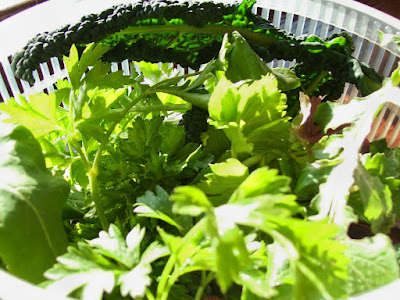
Leafy greens collected from my garden yesterday for a salad.
Okay. I'll confess.
I've dined on horse meat.
Unfortunately, it tasted wonderful. I was served the horse meat wrapped in bacon and delicately cooked with a slathering of a truffle-type mushrooms in a very classy, silver service restaurant in Paris. It was the only thing on the menu I didn't recognize and wanting to broaden my palette, had asked the waiter to recommend something. Only later did I realize what it was.
I wasn't going to write about unusual foods I have consumed other than vegetables, grains, and fruits, but this came up in a class I was teaching today. I was reading aloud a story to a high school crowd that takes place along the front lines of World War I. The unfortunate part of these reading aloud dramas is I usually get to jump in the fray at some point in the middle of the story. It took me about three pages before I realized the story was from the point of view of a horse. A riderless horse with an injured leg, roaming the no man's land between enemy lines.
When a German and a Welshman both lay claim to the horse and the Welshman suggested they can't go the route of King Solomon and cut the dang horse in half, my mind shuddered in revulsion at the thought of, "Oh, yes they can!" I had an immediate image of the German pulling out a service revolver, shooting the poor creature in the forehead and asking, "Heads or tails?"
The German did ask, but only as he flipped a coin into the air and had the Welshman call it to decide who kept the horse. (I later found out this excerpt was from the book that has inspired the soon-to-be-released movie "War Horse". Saw the trailer last night.)
They didn't eat the horse... this time.
But it made me think about what we consider food, and how culturally this is so varied. Some places think of insects as potential dining fare. I'm not sure how hungry I would have to be to give that a go, even though I understand cockroaches and crayfish to be more closely related than I would believe they should be.
It also makes me wonder how did any cultural group stray from eating a particular food and how we establish our food likes and dislikes. My son, for examples, regards tuna, especially that out of the small flat cans, in very much the same way I regard cockroaches, grubs, and beetles. Eat pickled herring in a wine or cream sauce? Wow, that would really make him blanch. Yet, historically, our mutual ancestors were herring fishermen in Greater Yarmouth, England and most likely sailed the coastline of the Low Countries as far as Friesland, where somewhere they met up with our great, great times many greats ancestress who spoke, read, and wrote German.
This ancestress later emigrated with her husband to a new land, America. And while she did learn to write, speak, and read English; she continued to speak English with a heavy German accent, setting her apart from her neighbors and which is the beginning of another long story which I will not account here.
Raising my son, I have learned how his palette has changed and grown. But where as a nation and a people did we forgo quince, medlar, even pears to a great extent to settle with the one size fits all generic apple? How have we made the leap from all sorts of game fish to just a few commercially caught types, cod, perch, and salmon? And how did turkey and chicken become the pre-eminent fowl choices foregoing other game birds and possible backyard-raised pigeon, squib, goose, pheasant, and quail?
It is up to us to diversify and localize our food stream. We need to break away from the lock-step of eating just what appears on the shelves of our local mega-grocery market chains. We need to skip the sugary cereals (ten of which are nearly half sugar by weight!) in favor of eggs, fruit, and whole grain.
And, by the way, Anderson Cooper, that leafy blue green leaf at the top of the picture is a form of kale.






No comments:
Post a Comment